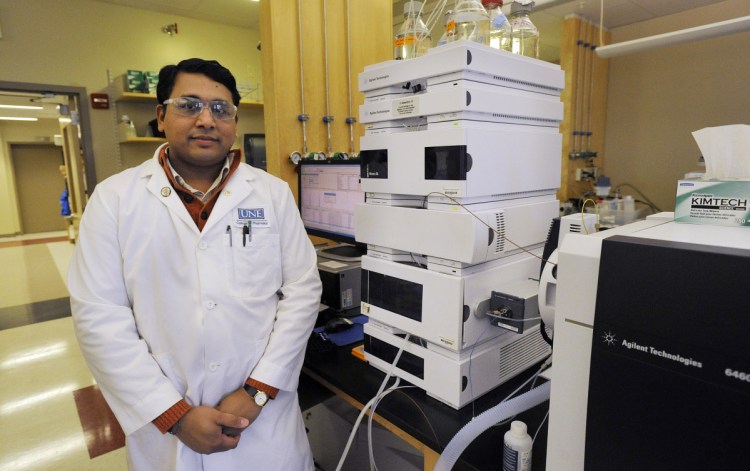A University of New England professor was awarded a patent Wednesday that could lead to future diagnostic tests for aggressive forms of breast cancers.
Dr. Srinidi Mohan, associate professor for UNE’s College of Pharmacy, said the patent from the U.S. Patent and Trademark Office is an important milestone in moving his research into federally approved clinical trials, and, eventually, to market.
About 60,000 women every year are diagnosed with estrogen negative or triple negative breast cancer, fast-moving and difficult to detect forms of breast cancer that manifest few symptoms before the cancer has reached an advanced stage, according to the American Breast Cancer Foundation. It is possible for men to get these types of breast cancers, but 97 percent of cases are women, Mohan said.
In 2014, while conducting unrelated research on nutritional supplements, Mohan discovered a “marker” for the cancers, the presence of a molecule in plasma when conducting a simple blood test. That discovery led to a mountain of research that now will be accelerated with the patent, which has been in “patent pending” status since the fall of 2016.
Mohan said the next steps will be clinical trials, likely collaborating with major players in the health industry, major universities or both. He is currently collaborating with the Maine Medical Research Institute in Scarborough.
“There is no more uncertainty because now we have the patent,” Mohan said in a phone interview. “We are in a much better position to move to the next stage.”
Mohan said if all goes well, the diagnostic tests could be available on the market within five to 10 years.
Karen Houseknecht, UNE’s associate provost for research and scholarship, said in a statement that the university is “proud to support” this research.
“Identification of a novel biomarker that can be used for early detection of some of the most aggressive forms of breast cancer may prove to be a huge benefit in the early diagnosis and treatment of breast cancer,” she said.
Mohan’s early research benefited from a $375,000 grant from the Maine Cancer Foundation.
“We are proud to play a role in the development of the screening tool and eager to see it disseminated widely so that women and their providers can detect this potentially lethal form of breast cancer early enough to stop it in its tracks,” the foundation’s executive director, Tara Hill, said in a statement.
Mohan first proved his hypothesis on one cell line in May 2015. Three months later, he was able to replicate the results by testing dozens of cell lines with African-Americans and Caucasians. Later, he tested the plasma of Jews, Asians and Hispanics. All the results were consistent.
Joe Lawlor can be contacted at 791-6376 or at:
jlawlor@pressherald.com
Twitter: joelawlorph
Send questions/comments to the editors.




Success. Please wait for the page to reload. If the page does not reload within 5 seconds, please refresh the page.
Enter your email and password to access comments.
Hi, to comment on stories you must . This profile is in addition to your subscription and website login.
Already have a commenting profile? .
Invalid username/password.
Please check your email to confirm and complete your registration.
Only subscribers are eligible to post comments. Please subscribe or login first for digital access. Here’s why.
Use the form below to reset your password. When you've submitted your account email, we will send an email with a reset code.